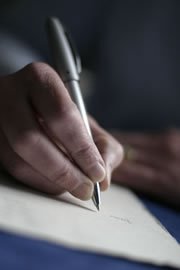
I went to see the movie Capote a few weeks ago, and I've been floundering over a written piece ever since: not a review of the film, nor a commentary on the book, In Cold Blood, but rather a reflection of the time. I'm still stewing with it. I will say this about the movie. It left me haunted and thinking for days afterwards--always the sign of good cinema in my mind. In the meantime, I went back and re-read In Cold Blood for the third time. One of the big issues when this book appeared was that it heralded a new method of writing: "historical fiction," so my latest reading was, more than anything, analyzing Capote's style. I've also ordered up from the library Gerald Clarke's biography of Capote, and I just finished reading his correspondence, Too Brief A Treat: The Letters of Truman Capote, edited by Gerald Clarke. Overall, the letters were a disappointment. For all of his love of his craft, for all of his love of society and gossip, it turns out Capote was rather a mediocre letter writer. Clarke states that Capote didn't write with posterity in mind, but rather in a free and natural voice. That proves unfortunate, because the decades fall flat even though they cover a succession of name dropping, a chronicle of the Trans-Atlantic gay crowd that Capote called "The Lavender Hill Mob," moanings about getting on with his work, and all of the varied physical ailments. He was, however, a dedicated friend and letter writer, and he did strenuously keep up with friends as he moved around the world. It is little remembered that Capote spent ten years of his life living in Europe, and oftentimes he was residing in remote, rural areas. You would have thought Capote was hunkered down in a hotel room in Holcomb, Kansas, but the bulk of In Cold Blood was written in a tiny village in Switzerland, while he was out taking the air with his pet bulldog or buying friends cuckoo clocks.
Our collective past relied so heavily on letter writing to keep in touch. I've often wondered what historical papered archive will survive in our generation of e-mails and texting. I just finished reading Capote's correspondence today, and in one letter written in 1962, he talks about the difficulties of sustaining friendship. He said, "There are certain people with whom one can be the closest and longest and most loving of friends--and yet they can quite quickly drop out of one's life forever simply because they belong to some odd psychological type. A type that only writes letters when he is written to, that only telephones when he is telephoned. That is--if one did not write him or phone him, one just will never hear from him again. I have known several people like that, and this peculiarity of theirs, this strange eye-for-an-eye mentality, has always fascinated me. Phoebe Pierce was like that: I have not heard from Phoebe in six years--merely because one day, in the nature of a test, I decided I would wait and let her call me. And she never did. Never. After sixteen years of the closest friendship! No quarrel. Nothing. It was just that all of the mechanics of the friendship had been worked by me. But--as I say, she would have behavedthat way with anybody. It's a type." He was writing this to a man he did sustain a friendship with over time, a man whowell knew societal isolation having being fired from Smith College over issues of his homosexuality.
Reading this struck a chord within me, because this past weekend I spent time updating all of my social calendars for 2006 which include birthdays, anniversaries and days of note, as well as re-doing my address book, including a Palm Pilot format which I had written of earlier. Every year it's always amazing who gets "dropped." I may carry some of those "types" that Capote writes of on my lists for several years then finally give up and cast them off. I still mail Christmas cards with personal letters inside, and this is another dated concept with little return. That list, too, undergoes revisions every year. I'm as baffled as Capote was when he wrote that letter in 1962 in terms of the mechanics of friendship. I was talking to two friends online yesterday about this. We were discussing people we mutually knew and how they just never made any effort to keep in touch or show any effort to sustain a viable friendship, and like Capote, there was never any contention or upheaval to announce a break. Another friend today (speaking of this same group) said, "I would be happy with just an occasional "hi."" It is just beyond their capabilities or interests to do so, and thus the people fall away from us. One group of friends that I belong to have managed to keep together, and we talk with pride that we haven't had these silences and droppings off. We do pick up the telephone to reunit, we do mark important passages in each others lives (two had birthdays this weekend), and we do value what we've learned from holding on to this connection that binds us. The tasks I undertook this weekend, the conversations I had, and the reading of Truman Capote's correspondence reminded me of the work good friendships command. The friend I was speaking with this afternoon said, "Perhaps the real question we should be asking is "why do we go on trying?"
*** Remember: You can also find Washington Cube at:
Washington Cube http://washingtoncube.blogspot.com/

No comments:
Post a Comment